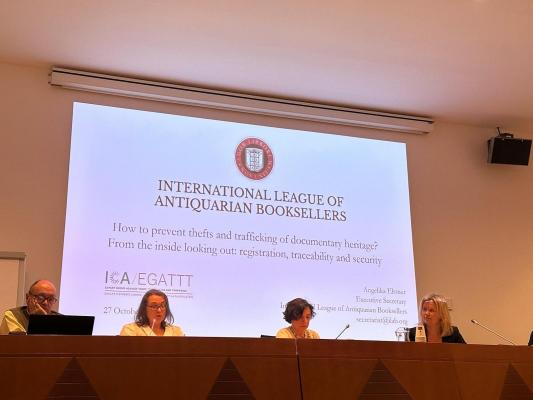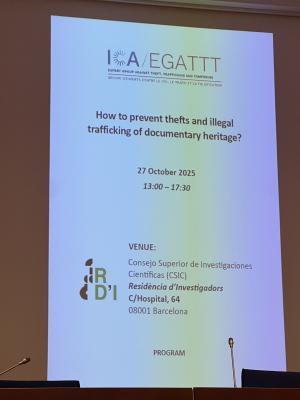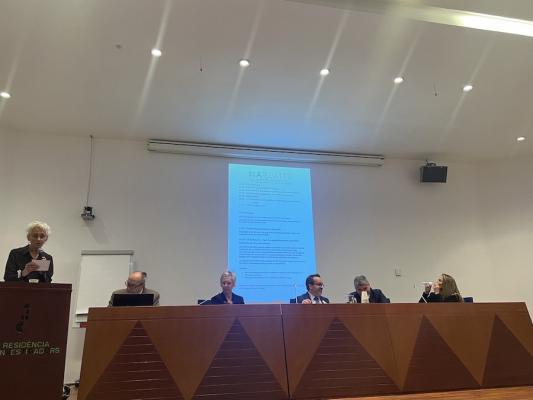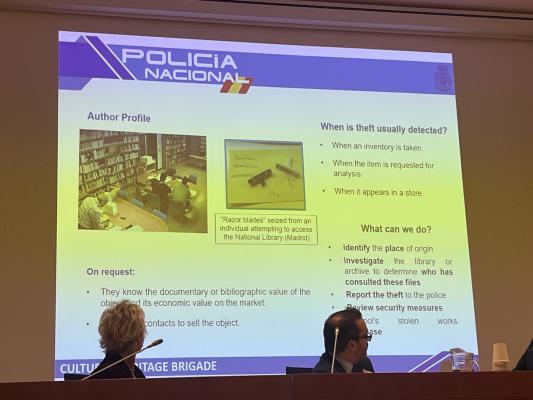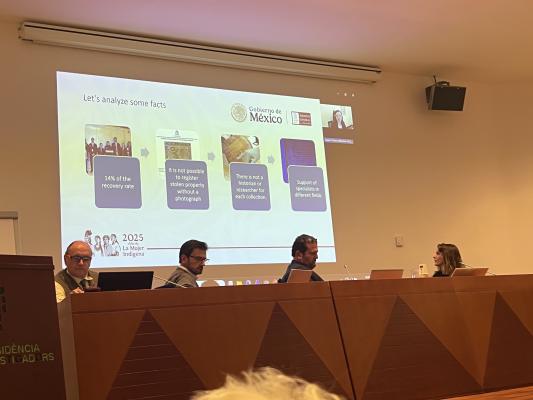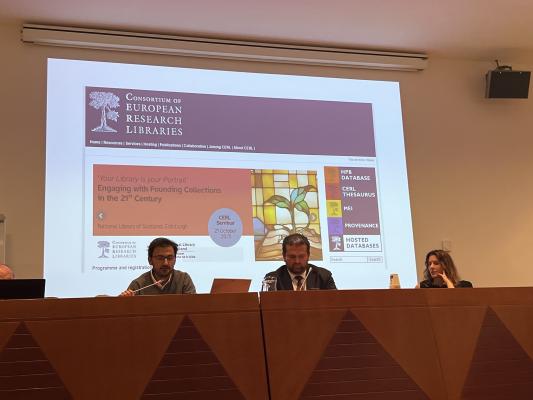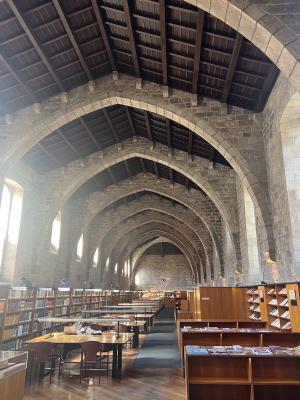News & Updates
International Advocacy on behalf of the rare book trade: ILAB and the ABAA at the ICA and EGATTT Conference in Barcelona

The meeting took place in the heart of Barcelona, just steps from the Library of Catalunya, housed in the historic Hospital de la Santa Creu, one of Catalonia’s most important Gothic civil buildings. Founded in 1907, the Library of Catalunya today serves as the national library, safeguarding and providing access to large collections that form part of the Catalan and wider bibliographic heritage.
ILAB’s attendance marked the first direct engagement with ICA since 2019, when preliminary contact was made during the early planning stages of the ILAB Stolen Books Database relaunch (now "ILAB Missing Books Register"). This renewed connection represents a valuable opportunity to ensure that the international rare book trade continues to be part of broader conversations about cultural heritage protection.
Throughout the day, speakers and participants from across the world discussed challenges in protecting documentary heritage, from cataloguing and provenance issues to theft prevention and information-sharing. ILAB was invited to present on the trade’s existing security systems, the ILAB Code of Usages, and the ILAB Missing Books Register, which provides a public platform for reporting and tracing stolen or missing books and antiquarian material.
The programme brought together a wide range of experts from archival institutions, law enforcement, academia, and the book trade.
Opening remarks were delivered by Arda Scholte, Chair of EGATTT, and Ana Gómez Rabal, Deputy Director of the Milá y Fontanals Institute of the Spanish National Research Council (CSIC).
ICA President Josée Kirps formally presented the Guide to Prevent Thefts and Illegal Trafficking of Documentary Heritage to Tiziano Coiro, Coordinator of the Works of Art Unit at INTERPOL.
The first panel, moderated by Eugenio Serrano Rodríguez (Provincial Council of Toledo), included contributions from Vincent Negri (Institut des Sciences sociales du Politique, France), Tiziano Coiro (INTERPOL), Ruth García Álvarez (Spanish National Police), Stéphane Ipert (Virginia Commonwealth University, Qatar), and Josée Kirps (ICA President and National Archives of Luxembourg).
The second panel, moderated by Helen Vincent (IFLA and British Library), featured Gillian Mapstone (National Records of Scotland), Isabel García-Monge Carretero (IFLA Rare Books and Special Collections Section / Spanish Bibliographical Heritage Union Catalogue), and Angelika Elstner (ILAB).
The third panel, chaired by Stéphane Ipert, included Marlene López Torrez (Archivo General de la Nación, Mexico), Isber Sabrine (Consejo Superior de Investigaciones Científicas – CSIC), Susan Benne (Antiquarian Booksellers’ Association of America, ABAA), and José Luis Buerén Gómez (National Library of Spain and CERL).
The discussions revealed that, while law enforcement, policymakers, and institutions are acutely aware of the risks of theft and illicit trafficking, there remains a limited understanding of how the legitimate rare book trade operates. ILAB’s presentation helped clarify that the international rare book trade is a structured, self-regulating international network of professional associations and dealers committed to ethical standards and collaboration in matters of provenance and security.
ILAB’s participation also underscored an important point: for the trade to assist in identifying and recovering stolen material, it must be informed when illicit objects might be circulating. Communication must therefore be two-way: institutions and the trade both benefit from open channels.
The tone of the event was professional and constructive. There was broad agreement that collaboration across sectors is essential: archives, libraries, law enforcement, and the trade all share an interest in safeguarding documentary heritage while ensuring its continued circulation and accessibility.
ILAB’s presence, together with our largest member association, the Antiquarian Booksellers Association of America, demonstrated that the trade is both responsible and willing to contribute actively to this effort. Discussions during and after the panels helped strengthen relationships with key international partners, including ICA, EGATTT, and CERL, whose work on security and provenance research complements ILAB’s initiatives.
The ICA also used the occasion to launch its new publication, the “Guide to Prevent Thefts and Illegal Trafficking of Documentary Heritage,” which is now available on the ICA website. This guide offers practical recommendations and international best practices to help institutions strengthen their internal security measures and prevent the loss of cultural property.
Engagement in international forums like ICA and EGATTT is an important part of ILAB’s ongoing advocacy work. Cultural heritage regulation is evolving rapidly, and decisions made at institutional level often shape the policies and legislation that will affect the trade. ILAB aims to have a voice in these discussions to ensure balance, accuracy, and proportionality in cultural heritage policy. ILAB will continue showing that the rare book trade is not an outsider to be monitored, but a partner: professional, organised, and committed to protecting our shared documentary heritage.
About the Organisers
International Council on Archives (ICA)
The ICA is a global organisation dedicated to promoting the preservation, management, and accessibility of archives worldwide. It supports the archival profession through standards development, training, advocacy, and by fostering international cooperation among archives and archivists. Founded in 1948 and headquartered in Paris, the ICA represents over 1,600 members, including national and regional archives, professional associations, and individual experts in documentary heritage.
Website: www.ica.org
Expert Group against Theft, Trafficking and Tampering (EGATTT)
The EGATTT is a specialist body within the ICA, established in 2017 to combat the illicit trade, theft, and tampering of documentary heritage, such as archives, manuscripts, and rare books. EGATTT provides a platform for expert dialogue, develops strategies to enhance institutional security, and collaborates with organisations including UNESCO, INTERPOL, UNIDROIT, and the World Customs Organization. It promotes legal frameworks such as the 1970 UNESCO Convention and the 1995 UNIDROIT Convention, and regularly conducts surveys and training to strengthen the protection of cultural property.
Website: https://www.ica.org/en/egattt
Consejo Superior de Investigaciones Científicas (CSIC)
The Consejo Superior de Investigaciones Científicas (CSIC), the Spanish National Research Council, is Spain’s largest public research institution and one of the most renowned in Europe. Founded in 1939, CSIC operates under the Spanish Ministry of Science, Innovation and Universities. It coordinates a wide network of research centres and institutes across Spain, covering disciplines from the humanities and social sciences to biology, physics, and engineering. The conference venue, the Residència d’Investigadors in Barcelona, forms part of CSIC’s network and serves as a hub for scientific exchange, cultural dialogue, and academic collaboration.
Website: www.csic.es
Library of Catalunya (Biblioteca de Catalunya)
Founded in 1907 as the library of the Institut d'Estudis Catalans (IEC), the Library of Catalunya is located in the Hospital de la Santa Creu in Barcelona, one of the most important Gothic civil architectural complexes in Catalonia. In 1981, the Parliament of Catalonia granted it the status of a national library.
The Library’s mission is to collect, preserve, and disseminate Catalan bibliographic production and works related to the Catalan linguistic sphere. It ensures the conservation and accessibility of Catalonia’s bibliographic heritage while maintaining its role as a universal centre for scientific research and consultation, both in analogue and digital formats.
Since its foundation, the Library has acquired documents, collections, and private libraries of diverse provenance. Since 1981, it has also received copies of publications deposited under Legal Deposit, forming part of the Catalan bibliographic and cultural heritage.
Today, the Library’s holdings comprise over 4.5 million items of great bibliographic and documentary value, encompassing a wide variety of materials and formats. Its manuscripts and archives range from medieval works, such as the Organyà Homilies, to the letters and writings of major 20th-century Catalan authors, including Eugeni d'Ors, Josep Carner, and Maria Mercè Marçal. The collection also features a remarkable array of parchments, autographs, and noble, commercial, and institutional archives—notably the distinguished Junta collection.
Website: www.bnc.cat
Text and images: Angelika Elstner

